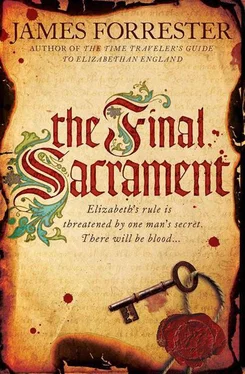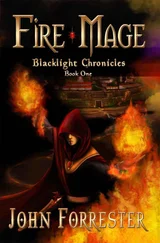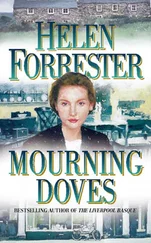James Forrester - Final Sacrament
Здесь есть возможность читать онлайн «James Forrester - Final Sacrament» весь текст электронной книги совершенно бесплатно (целиком полную версию без сокращений). В некоторых случаях можно слушать аудио, скачать через торрент в формате fb2 и присутствует краткое содержание. Жанр: Исторический детектив, на английском языке. Описание произведения, (предисловие) а так же отзывы посетителей доступны на портале библиотеки ЛибКат.
- Название:Final Sacrament
- Автор:
- Жанр:
- Год:неизвестен
- ISBN:нет данных
- Рейтинг книги:5 / 5. Голосов: 1
-
Избранное:Добавить в избранное
- Отзывы:
-
Ваша оценка:
- 100
- 1
- 2
- 3
- 4
- 5
Final Sacrament: краткое содержание, описание и аннотация
Предлагаем к чтению аннотацию, описание, краткое содержание или предисловие (зависит от того, что написал сам автор книги «Final Sacrament»). Если вы не нашли необходимую информацию о книге — напишите в комментариях, мы постараемся отыскать её.
Final Sacrament — читать онлайн бесплатно полную книгу (весь текст) целиком
Ниже представлен текст книги, разбитый по страницам. Система сохранения места последней прочитанной страницы, позволяет с удобством читать онлайн бесплатно книгу «Final Sacrament», без необходимости каждый раз заново искать на чём Вы остановились. Поставьте закладку, и сможете в любой момент перейти на страницу, на которой закончили чтение.
Интервал:
Закладка:
The gallows itself was a large timber frame of three interlocking beams-an oak triangle-on three huge upright oak supports. From each side of the triangle hung three nooses, ominously empty. The entire structure, massive though it was, could be seen to move slightly as the crowd pressed in around it, causing the empty nooses to sway. The cart came to a halt beneath the first of the great beams and two executioners placed sackcloth bags over the heads of the first three victims followed by the nooses. Then the back of the cart was let down. No one paid any attention to the priest at the foot of it, who tried to read words of consolation to the prisoners. One of the women and two of the men stood shivering and crying, muttering prayers until suddenly the cart gave a lurch and moved off. A huge roar went up as the crowd saw the three bodies twisting and spinning on the end of the ropes. The men with the halberds pushed them back, to make way for the cart to turn, as the three hanging prisoners began to twitch, their bodies struggling for breath.
After the next three prisoners had been left choking on the end of a rope, it was the turn of the last three, including Sir John. The cart turned and came to rest directly beneath the third beam. As the executioner climbed up onto the cart and started to put the hoods over their heads, Sir John stood grim-faced, looking down at the crowd, waiting his turn. He was second-to-last. Next to him stood a terrified young woman. “I am innocent,” she wailed. “Tell my girls I died an innocent woman. It was John Lucas who took Mr. Robert’s linen.” But the crowd simply laughed at her and mimicked her plea. To their great delight, the executioner forced a kiss upon her lips and squeezed her breast before covering her head too and placing the noose over her neck and tightening it.
Thomas closed his eyes. He wished the whole lamentable business was over. But when he opened them again, to his horror, he saw Clarenceux climbing up onto the back of the cart. He tried to get to him, but Clarenceux had already started to declaim to the crowd. The people closest to him were so startled to hear such a voice booming out that they fell silent, and soon the whole crowd was wondering who this was and what he had to say.
“You laugh-you laugh today at these unfortunate creatures before you and those”-he gestured toward the six now motionless corpses-“and you laugh away your humanity. These are not all villainous murderers dying here. These are not all thieves. There is a good man here, a priest, who would stand up for his fellow men. He would stand up for you, even though you are strangers. When you laugh at him, you laugh at the ties that bind us to our fellow men. You laugh at what is good in you. You laugh at kindness; you laugh at the courage to stand up against the constables who would rule your lives with an order and a knife…”
A clod of earth was thrown. It missed Clarenceux, who carried on regardless. “Sir John is destined to be killed because what he believes is unwelcome to the State. And the State insists that it must come first-before your friends, before your family-yea, even before your faith. Who here, doing the business of the State, loves the State more than his own kin? Who here would put the queen above God? Do you not see what the destruction of the Church has brought upon us?”
Already there were mutterings. Then the jeers started. The crowd had not come to be preached at. They had come to watch a spectacle, to meet people, perhaps have an illicit assignation or cut a purse from a stranger’s belt. They wanted to be entertained-and to that end they did not mind hearing a gallows speech from someone less fortunate than themselves. But they did not want to be spoken to about the queen; nor did they wish to hear anything concerning the Church. They resented Clarenceux’s intrusion. But they laughed again-heartily-when the executioner picked up a sackcloth bag and placed it jokingly over Clarenceux’s head. As the hooded figure of Sir John called out, “God be with you, William,” and the crowd erupted with noise and cheering, Clarenceux tore off the bag and threw a punch at the executioner, hitting him sooner than he expected, so that he struck the man hard on the nose, and he himself toppled backward. Both men fell off the cart into the crowd. Before he could regain his feet, the crowd had taken over the executioner’s role and smacked the horses into life, pulling away the cart and leaving Sir John and the other two prisoners hanging.
Clarenceux struggled to his feet and waded through the jostling mass to the figure of Sir John. Thomas joined him as he made the sign of the cross. Together they reached up, took hold of Sir John’s legs, and jumped with all their weight, pulling him down suddenly and breaking his neck. Several men did likewise with the young woman whose body was jerking beside the still form of Sir John.
Clarenceux stood panting, with mud on his face. He looked at Thomas and placed a hand on his shoulder. No sooner had he done so than one of the guards knocked his arm away with the shaft of his halberd. Two others seized his arms and proceeded to tie his hands behind his back. “You will face the justices tomorrow,” said the first guard. “Take him to Newgate. Since you want to be on that cart so much, we’ll see you get your chance.”
4
In the small dining room at Cecil House, Sir William sat alone at table. The door was shut. Before him was a silver salt cellar, a silver dish containing a roast capon and some slices of roast beef, two silver saucers-one with a mustard sauce, the other with a white wine and onion sauce-some bread, a drinking glass, and a flagon of wine. He did not feel hungry. Or, to be exact, his yearning to have some time to himself outweighed his hunger. He broke the bread and set it down on the white linen tablecloth, looking at the crumbs, playing at them with one finger. He then glanced up at the portrait of his wife, Mildred, that hung above the fireplace.
Life is a labyrinth , he thought, as he pushed the crumbs into a line. The way in is simple enough, at birth, and the way out easy enough, at death; and no one can fail to find a path between the two. Yet how few people find their way to the mysteries at its heart? Most of us are lost. Most of us depend on maps which are in themselves labyrinthine. The Bible is one such map, poetry another. The breadcrumbs were arranged in a neat row; now he moved them into a circle. For the most part we rely on direction through simplification. The art of government, like the arts of writing, astrology, and navigation, is to make such simplifications meaningful. Politics is the art of meaningful simplification-purposeful lies.
He reached forward, cut a slice of beef in half, picked up one piece with his fingers, and dipped it in the mustard sauce. The rich taste of the meat made his mouth water. Its robust flavor, coupled with the smooth piquancy of the mustard, which affected his nose, gave him an instant of pleasure, and he rediscovered his hunger. He took a piece of bread and dipped it in the white wine sauce. That too was good. French sauciers are the best , he reflected, reaching forward with his knife to cut a slice of capon. He dipped this in the same sauce, as one of his ushers knocked at the door.
“Do not disturb me,” he said.
There came another knock.
Cecil hurriedly picked up another piece of beef with his fingers, dipped it in the mustard sauce, and pushed it into his mouth. Still chewing, he sliced a second piece of capon and dipped that in the white wine sauce. Every moment a new opening appears in the labyrinth .
The usher knocked a third time. “Sir William, Mr. Walsingham has come to see you. He craves your attention most insistently.”
Читать дальшеИнтервал:
Закладка:
Похожие книги на «Final Sacrament»
Представляем Вашему вниманию похожие книги на «Final Sacrament» списком для выбора. Мы отобрали схожую по названию и смыслу литературу в надежде предоставить читателям больше вариантов отыскать новые, интересные, ещё непрочитанные произведения.
Обсуждение, отзывы о книге «Final Sacrament» и просто собственные мнения читателей. Оставьте ваши комментарии, напишите, что Вы думаете о произведении, его смысле или главных героях. Укажите что конкретно понравилось, а что нет, и почему Вы так считаете.












